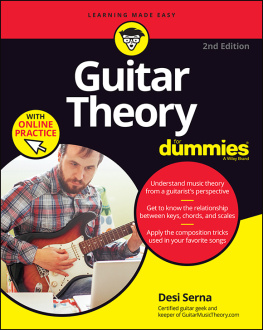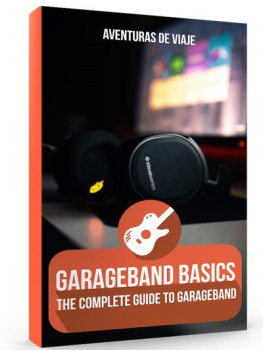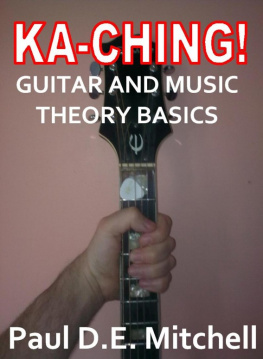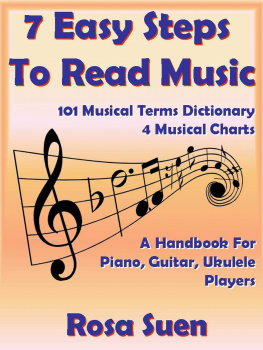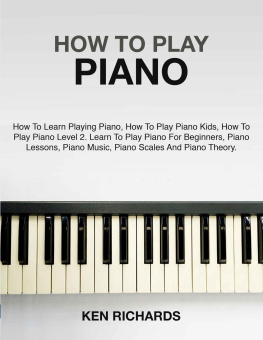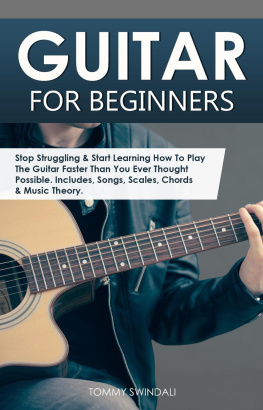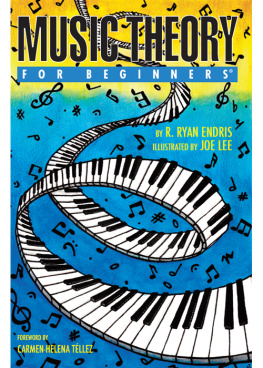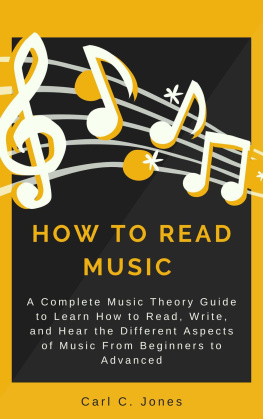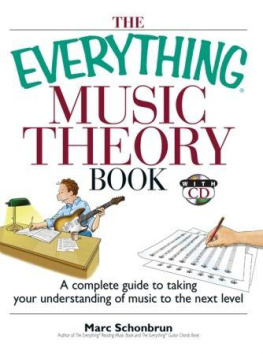First of all, I want to thank you for your purchase.
I would like to let you know that you can use several free resources that I have prepared for you, which will help you put into practice what you will learn.
In the link you will find a copybook for musical exercises and sever-al audio tracks that will facilitate your learning.
You will find the link on the last page of the book.
KNOW THIS FIRST
Before we start anything, I have to let you know that this book is not gonna be just another music theory text. There are tonnes of those and if what you want is just another one, then you have the wrong book. This book is intended to be more than just a music theory text that tells you about sharps, flats, intervals, scales, and stuff. This book is designed to be a musician s companion, the rea-son you should keep creating music, a guide, a friend, a reference, a helper, and a motivation for musicians of all levels and for everyone who loves music and life, because music itself is life. Before we go a step further, let me tell you a short but really cool story:
At the very young age of five, he wrote an advanced concerto for the harpsichord. Before he turned ten, he had successfully published several violin sonatas and was already playing the best of Handel and J. S Bach from memory. Immediately after his twelfth birthday he successfully composed and conducted his first opera. He was lat-er awarded an honorary appointment as concertmaster by the re-nowned Salzburg Symphony Orchestra, and within just a few years, he was praised as the pride of Salzburg. When he finally died at the young age of thirty-five he had written, all by himself, forty-eight symphonies; forty-seven duets, arias, and quartets with complete orchestral accompaniment; and more than twelve operas. He is cred-ited with some six-hundred original compositions in total. Even at all this, Wolfgang Amadeus Mozart lived most of his life in abject poverty and died in total obscurity. Only a very few friends made it to the church for his funeral service, but a fierce storm stopped them from going to the graveside for his burial. Because of this, the loca-tion of Mozart's grave became virtually impossible to identify. There is no tombstone or shrine to mark his resting place.
But today, what is Mozart remembered for? What is Mozart's legacy? I am not asking about the life he lived but rather, the music he gave the whole world. Actually, this is some very important music theory that you will never be taught in college or on YouTube. It's not about the life you live, how much you get paid or how much you take from the world; its 98.9% about how much you give to the world. In this case, the music you leave behind long after you are gone.
I always love this quote by the famous rapper Jay Z:
"Fear not when, fear not why,
Fear not much while we're alive,
Life is for living, not living uptight,
Till you're somewhere up in the sky,
Fear not to die, I'll be alive for a million
years, bye-byes are not for legends,
I'm forever young
My name shall survive"
Like I said earlier, this is not gonna be the conventional music theo-ry book, this book is something entirely different. I want this book to be of real use to you and not just something that tells you about some sharps and some flats- I want it to be your real companion. Before we go any step further, let's take a look at some very uncon-ventional music theories, by which I mean some really handy and useful quotes by some not-only-famous-and-successful-but-also-really-good musicians:
Works of art make rules; rules do not make works of art.
Claude Debussy
I can t understand why people are afraid of new ideas. I am afraid of the old ones [ideas].
John Cage
The real music is not in the musical notes, but in the silence be-tween the musical notes.
Wolfgang Amadeus Mozart
"The wise musicians are those who play what they can master.
Duke Ellington
Musicians don t retire; they stop when there s no more music in them.
Louis Armstrong
If everything was okay and perfect, you would never ever learn and you would never ever grow.
Beyonc
The goal is to try and make the perfect song. Which of course will never happen.
Chris Martin
Time you enjoy wasting was not wasted.
John Lennon
"Music is the weapon of the future."
Fela Kuti
HOW TO OPTIMIZE THIS BOOK AND MAKE THE BEST OUT OF YOUR PRACTISE/STUDY SESSIONS
Now that you have started this musical journey, it s really necessary to also focus on how to keep it going. Here are a couple of very im-portant reasons to keep up this new habit, as well as some few gen-eral tips to improve your practice, study and learning habits:
Always think about the benefits
Even though there are numerous benefits to learning music theory (which I'm definitely going to go over), did you by chance know that just listening to and learning music is enough to alter brain structure? It can improve memory, mood, coordination, motivation, and even reduce stress and improve sleeping habits! Whenever you need the simplest reason or the motivation to keep going, just think of this very simple benefit. There are tonnes of bigger benefits to studying music theory and practicing your instruments as well.


